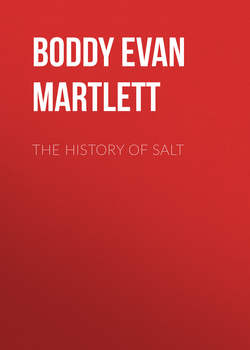The History of Salt

Реклама. ООО «ЛитРес», ИНН: 7719571260.
Оглавление
Boddy Evan Martlett. The History of Salt
CHAPTER I. INTRODUCTION
CHAPTER II. HISTORY OF SALT
CHAPTER III. SALT AS A CHEMICAL, THERAPEUTICAL, AND TOXICOLOGICAL AGENT
CHAPTER IV. GEOGRAPHICAL DISTRIBUTION
CHAPTER V. GEOLOGICAL FORMATION OF SALT
CHAPTER VI. EFFECTS ON ANIMAL AND VEGETABLE LIFE
CHAPTER VII. MEDICINAL AND DIETETIC PROPERTIES
CHAPTER VIII. PHYSIOLOGICAL PROPERTIES
CHAPTER IX. CONCLUSION
APPENDIX
Отрывок из книги
I am approaching a subject somewhat novel and indeed difficult, and very probably it may be regarded by some as one far from being profitable or interesting; therefore I shall endeavour, though with some degree of diffidence, to consider it not only from a medical point of view, but to glance at some facts, both historical, geographical, and geological. By so doing, we shall be touching upon other matters not only pleasing but instructive, and which to a great many are but indifferently known; for though salt is to be almost universally seen on the tables of rich and poor alike, yet few are aware of its undeniable medicinal virtues, and many are totally ignorant of the great sustenance they derive from this indispensable and undoubtedly savoury condiment, besides being but moderately acquainted with its history. At the present time it is used nearly all over the world, and is acknowledged to be at least an adjunct necessary for perfect cookery; it is in requisition in fact everywhere, and even those who do not use it would be considered as lacking in taste were they to discard it altogether from their tables.
All, however, are to a certain extent cognisant of the fact of how insipid the daintiest dishes taste, if salt is omitted in their preparation, and the cook, however expert he may be in the culinary art, invariably fails in giving satisfaction (except to those whose palates are deranged or vitiated) if they are not seasoned with it; few, I think, will deny that animal food in particular is deprived of its pleasing flavour if it be eaten without salt. Those who have an unnatural aversion to it should bear in mind that the ingestion of improper animal and vegetable food frequently occasions many severe attacks of illness, and invariably provokes and intensifies that universal complaint, dyspepsia. George Herbert tells us in his Jacula Prudentum, that “Whatever the father of disease, ill diet is the mother;” and if food is taken into the stomach without its proper portion of salt, it is not what one would consider as wholesome; on the contrary, it is most decidedly “ill diet:” and being such, the system does not derive that kind of nutriment suitable for the promotion of a healthy action of the organs of the body, neither are the secretions in such a condition as is compatible with health. Physiologists inform us that the saliva1 holds salt in solution, and that it is also present in the gastric juice, which indicates at once how highly necessary it is for the system to be regularly supplied with it; for it is a physiological fact that the process of deglutition and digestion is partly due to the disintegrating and solvent action of these two secretions on the food, especially the latter; and consequently if the nutritious particles are to be absorbed in a state fit to make up for the waste of tissue, they ought to contain a sufficient amount of the chloride of sodium to take the place of that which has passed off through the media of the skin and the kidneys.
.....
“The hieroglyphic writing had passed through all its stages of formation; its principles had become ascertained and settled long before we gain the first glimpse of it; the decimal and duodecimal systems of arithmetic were in use; the arts necessary in hydraulic engineering, massive architecture, and the ascertainment of the boundaries of land, had reached no insignificant degree of perfection. Indeed, there would be but very little exaggeration in affirming that we are practically as near the early Egyptian as was Herodotus himself. Well might the Egyptian priests say to the earliest Greek philosophers: ‘You Greeks are mere children, talkative and vain; you know nothing at all of the past.’”12
There is another channel which we will now take into consideration: the Philistines, who are supposed to have been descended from the Hycksos, or Shepherd Kings of Egypt, must have carried with them not a few of those customs which were in fashion amongst the sons of the founders of the gloomy temples of Memphis and Luxor; and on their expulsion by the regenerated Egyptians they were probably much assimilated with them, owing to many years’ intercourse, and being located in the same country, though their nationalities were entirely distinct and their habits antagonistic, and notwithstanding the dislike the Egyptians had for, and their abhorrence of all those who were connected with, the grazing and the breeding of cattle; for whenever two nations mix promiscuously, however limited it may be, they are sure to adopt more or less each other’s peculiarities, both in language and customs. These Philistines, when they emigrated on their defeat, took with them Egyptian civilisation, and the various tribes surrounding their newly acquired territory were very soon initiated into customs of which, perhaps, they were previously ignorant. There is nothing to prove this, but we may certainly surmise as much, if only by inference.13
.....